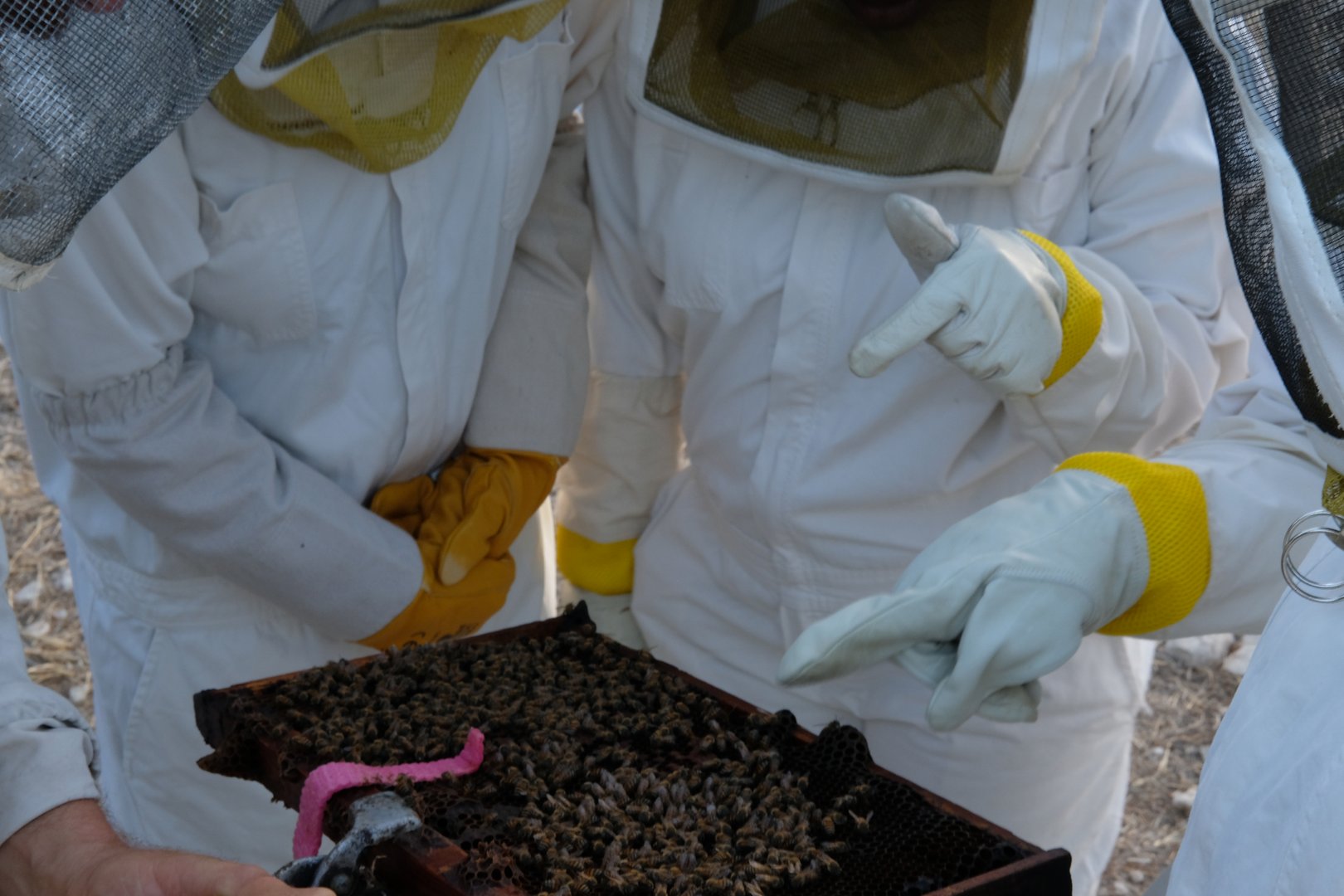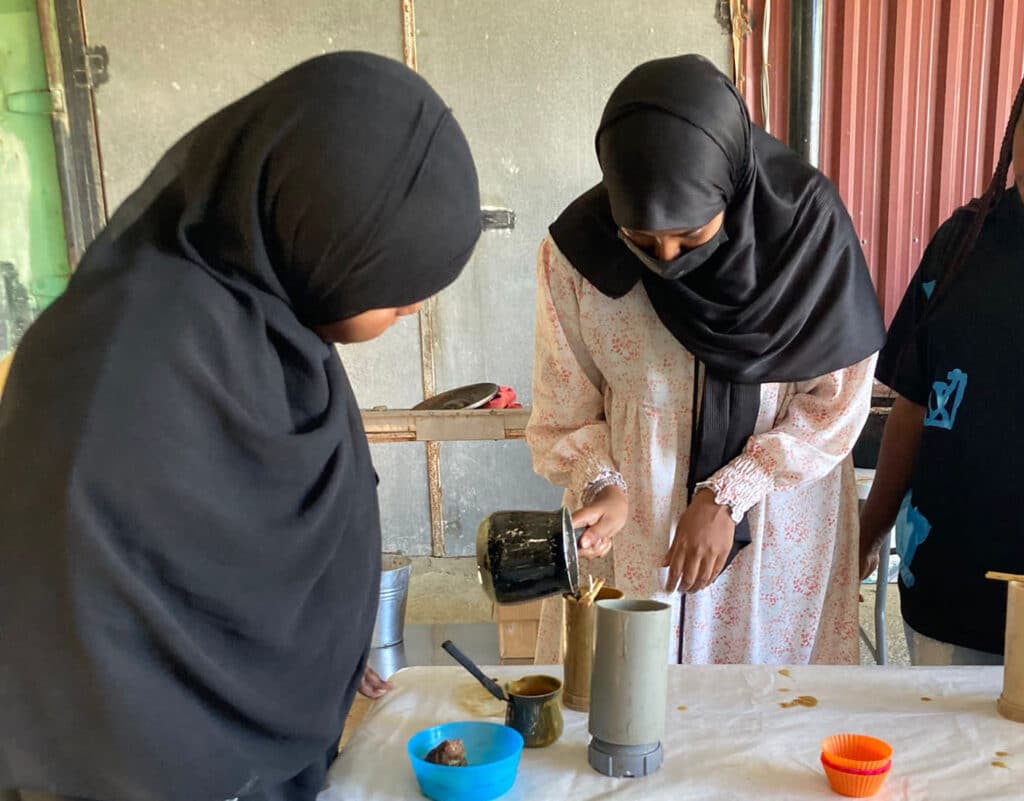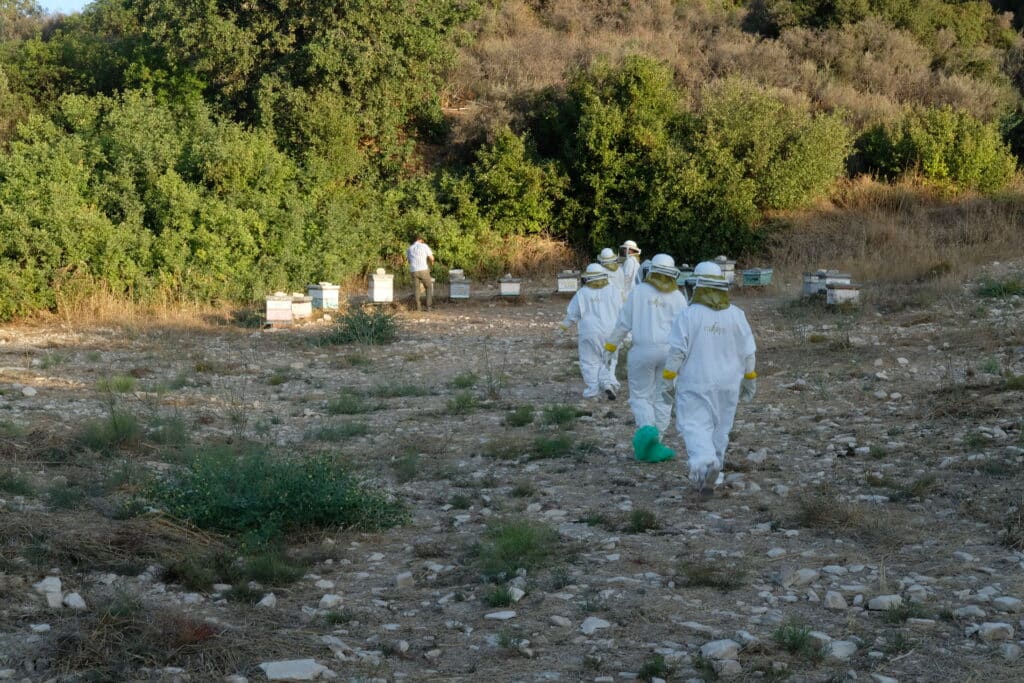ALIX NORMAN travels to Vavla to meet the unlikely young women who are reviving one of Cyprus’ most ancient professions
Above Larnaca, where the heat hangs heavy over the hills, a gentle hum fills the air. Here, among the lavender, rosemary and thyme, hives dot the landscape; hives that were once cared for by dedicated apiarists – bee-whisperers – who knew the magic of rearing queens, moving swarms and talking to their bees.
Today, those skills and knowledge have been all but lost; just a few young beekeepers tend the hives and keep ancient traditions alive. But, listen closely, and you’ll hear change is once more in the air: today, the hum is punctuated by soft laughter…
“These are our Queen Bees,” says Charlotte Storer, motioning to the teenage girls fascinated by a nearby hive. “All six are refugees or asylum seekers who arrived on the island unaccompanied from Africa; from Somalia, Congo, or Cameroon.”
“At first,” says 15-year-old Abigail, turning from the hive and speaking to us through a translator, “I just came to see. But now I have learnt about the bees and their products and the ways they help us all. It is,” she adds, a smile lighting her eyes, “wonderful!”
Charlotte is one of the founders of this unique programme; Abigail a refugee who is learning all about beekeeping in Cyprus. We’ve changed Abigail’s name to protect her identity: displaced girls are considered to be among the most vulnerable sectors of society, easy prey for exploitation, discrimination and stigma. But with the help of the Queen Bees programme, it’s hoped that both she and the other young women will heal past traumas and go on to become fully integrated into local society.
“Through Queen Bees, we hope to offer unaccompanied female minors a better future,” says Charlotte. “We’re helping both these young women and our island home by reviving the ancient art of beekeeping…”
Similar to programmes that have been trialled successfully in the UK, Germany and Italy, the Queen Bee project has a worthy aim. “The whole world is dealing with the refugee challenge,” says Charlotte. “But where others saw a hindrance, we saw an opportunity; rather than sidelining new arrivals, we’re helping them to properly integrate, learn new skills and become productive members of society.”
Through the Queen Bee programme, Charlotte and her fellow founders (Sarah Cohen, Maria Erhard, and Carolin Martz) are offering participants transferrable skills such as language acquisition, education and financial independence. They’re also providing a safe space in which the young women can heal from past traumas, develop confidence and connect with their new society. “And of course there’s always the hope is that, in time, perhaps one or more of the girls will take up beekeeping – keeping this craft alive on the island,” says Charlotte.
“Beekeeping has always been one of the island’s traditional professions,” she adds. “But with both bees and beekeepers dying off, it’s a craft that’s rapidly being lost. Which is a shame, because not only does beekeeping contribute to both the island and beyond, it also teaches exponents many valuable skills: financial management, product making and marketing, problem-solving, community engagement, resilience and adaptability, customer service, environmental awareness, and leadership.”
Funded by Glocal, supported by the Pears Foundation, and taking place with the kind cooperation of the Ecophysis Bee and Nature Education Centre, this non-profit venture is the first of its kind on the island, and the current Queen Bees are the inaugural group.
“We began by visiting the Larnaca shelter, and introducing the idea to the girls,” explains Charlotte. “There was great interest; beekeeping is an in almost international practice, a cultural connector. But this was the first time the girls had come across the profession, and they were fascinated. We showed them photos, talked about the skills involved, and six signed up immediately!”
Today, these six are almost at the end of their time at the Ecophysis Centre in the village of Vavla. Working with the Centre’s Director, Georgia Shoshilou, and its Chief Beekeeper, Costas Stylianou – both of whom are passionate about bees and beekeeping – the young women have been introduced to a host of valuable skills.
“Over two weeks, we’ve learnt about bee behaviours and safety, about the different types of honey and the plants needed to produce them, about how the seasons affect the swarm,” Charlotte reveals. “The girls have extracted frames, and learnt how the harvest becomes the jar of honey you see on the shelf. They’ve made bee hotels too, taking the extra clay back to the shelter to make another for their temporary home. And they also made their own balms and candles from wax and the by-products of honey production.”
“That was my favourite day,” says 16-year-old Grace, bouncing over to us. “I think I would like to make these things in the future! And then I shall promote them on social media, I think.”
“They’ve also enjoyed associated workshops, such as wildlife photography and label making, along with a host of activities designed to encourage confidence, resilience and connection and reduce stress,” Charlotte continues. “And, at the same time, we’ve had classes in financial literacy, marketing, and product development.”
In September, the same group will enjoy a follow-up programme, packed with more of the same. “This will allow us to gauge the impact and helpfulness of Queen Bees,” says Charlotte. “It’s the first project of its kind in Cyprus, so we certainly have an eye on the future.
“It’s possible,” she concludes, looking fondly at her charges, “that the next generation of Cyprus’ beekeepers might be among this group. If the past is anything to go by, more than a few of these girls will gain residency and remain on the island. It’s good to know that not only have we taught them transferrable skills that can contribute to local society, but that also, one or more might sustain the important legacy that is beekeeping in Cyprus…”
For more information or to donate to the project, visit the Queen Bee gofundme page









Click here to change your cookie preferences